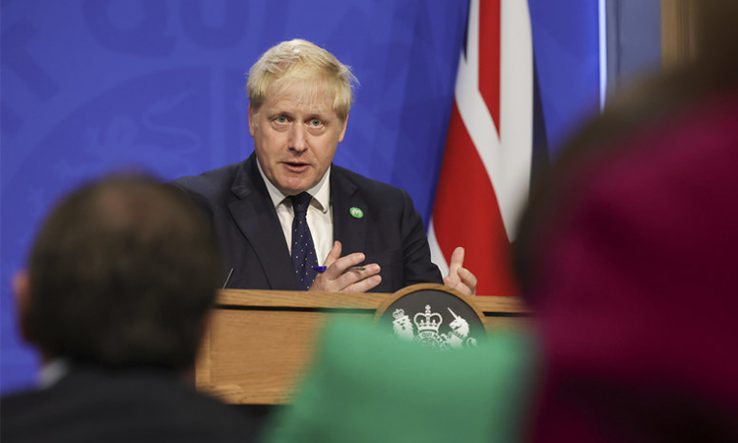
Image: Number 10 [CC BY-NC-ND 2.0], via Flickr
Scientists say planned interventions must be made quickly to bring virus back under control
Interventions to keep Covid-19 under control must be acted on “fast and early”, scientists have warned, after the UK government announced its plan for managing the virus over the autumn and winter months.
Unveiled by prime minister Boris Johnson on 14 September, the current plan consists of five pillars, including pharmaceutical interventions; identifying and isolating positive cases; supporting the NHS and social care; advising people on how to protect themselves and others; and pursuing “an international approach”.
“Covid is still out there,” said Johnson. “The disease sadly still remains a risk. But I’m confident we can keep going with our plan to turn jabs jabs jabs into jobs jobs jobs.”
The news came as Scientific Advisory Group for Emergencies modelling suggests that between 2,000 and 7,000 people per day could be hospitalised with Covid-19 in England alone next month, which would be more than last winter’s peak.
In the event that ‘Plan A’ is not sufficient to prevent overwhelming pressure on the NHS, the government said a number of ‘Plan B’ measures to help control transmission of the virus would be kept under review.
These include: the introduction of mandatory vaccine-only Covid status certification in “certain, riskier settings”; legally mandating face coverings in certain settings; and communicating “clearly and urgently to the public if the risk level increases”.
Elsewhere in its plan, the government announced support for further research into Covid-19, including research to assess ventilation levels in a range of business settings. The government said it was also investing £50 million in research to better understand the causes of, and potential treatments for, long Covid.
In addition, the government said it would continue to work with the life-sciences sector “to ensure that effective therapeutics, including antivirals, complement the vaccination programme to enable the long-term management of Covid-19 and its clinical impacts”.
It also said that the impact of the use of the NHS Covid Pass is being further assessed through the findings of Phase II and Phase III of its Events Research Programme.
“We will continue to update our advice to you based on the latest data,” Johnson said.
‘Act fast and early’
Mark Woolhouse, a professor of infectious disease epidemiology at the University of Edinburgh, described the package of measures as a “sensible and proportionate response to the Covid-19 threat in the UK this coming winter”.
But he stressed that it was important that the interventions were “acted upon quickly”.
“The number of people in hospital with Covid-19 continues to grow—albeit slowly—and light-touch interventions instigated now are the most effective way of ensuring—as we all hope—that more drastic interventions are not needed later on,” he said.
Anne Johnson, president of the Academy of Medical Sciences, agreed. “The pandemic has taught us that to minimise the spread of Covid-19, and potential pressures on the NHS, it is essential to act fast and early, bring the virus back under control, and prevent higher levels of transmission later on,” she cautioned.
“Although the numbers of hospital admissions are currently creeping up, we now have effective vaccines and a wealth of knowledge that we didn’t have when approaching winter last year.
“Good planning and fast action are essential to pre-empt significant health challenges, and we must work together to combat severe illness in autumn and winter this year.”
But Simon Clarke, an associate professor in cellular microbiology at the University of Reading, said the government’s ‘Plan B’ “leans on the same ideas as previous lockdowns, that if people can’t be trusted to limit their own interactions, test regularly and take personal responsibility, then increasingly more stringent measures will need to be imposed to bring things under control”.
“The issue, however, is that these measures have been a poor way of controlling the coronavirus because, by the time they have been imposed, it’s always been too late and the virus is so common in society that it takes a long time to get back under control,” he warned.
As the second winter of Covid-19 approaches, Clarke said the UK simply “cannot wait for the government to order citizens on how to control the coronavirus if we hope to keep any of the freedoms we currently enjoy”.